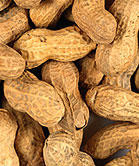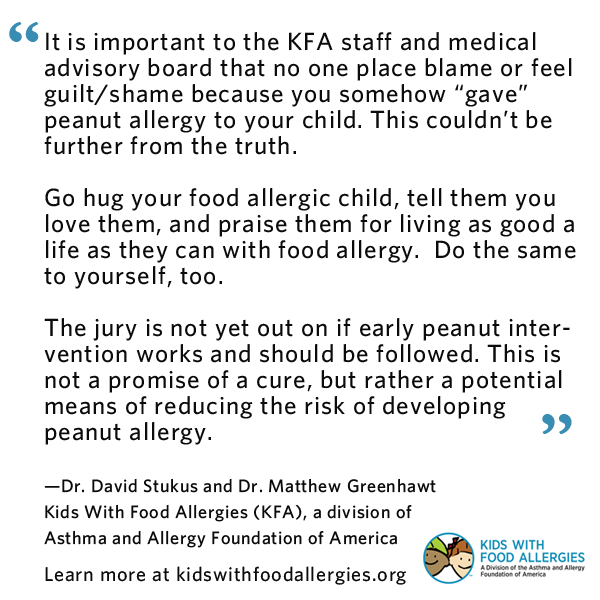Why It’s Important to Read Past the Headlines -
Doctors Explain New Peanut Allergy Study
Editor's note: The KFA/AAFA leadership recognize that interpreting the findings of the Learning Early About Peanut (LEAP) study is difficult, with so many people offering so many opinions. We have asked two of our medical experts—Drs. David Stukus and Matthew Greenhawt—to help you all “read past the headlines.”
 The food allergy community, including allergists, parents, and anyone living with peanut allergy, has been abuzz since the unveiling of the results from the landmark study Learning Early About Peanut Allergy (LEAP). The increased chatter has unfortunately included many different interpretations of the data, many by unqualified people (including some physicians!) Research studies can be difficult to interpret. There are often very situational-specific issues regarding the methods used to conduct the study, select participants, and how applicable the results may be. In an effort to gain extra clicks or more readers, headlines often defer to eye catching and misleading statements - or do a better/worse job at explaining those aforementioned issues. That’s why it’s so important to read past the headlines when forming opinions about medical research findings.
The food allergy community, including allergists, parents, and anyone living with peanut allergy, has been abuzz since the unveiling of the results from the landmark study Learning Early About Peanut Allergy (LEAP). The increased chatter has unfortunately included many different interpretations of the data, many by unqualified people (including some physicians!) Research studies can be difficult to interpret. There are often very situational-specific issues regarding the methods used to conduct the study, select participants, and how applicable the results may be. In an effort to gain extra clicks or more readers, headlines often defer to eye catching and misleading statements - or do a better/worse job at explaining those aforementioned issues. That’s why it’s so important to read past the headlines when forming opinions about medical research findings.
The details of the LEAP study were dissected and explained in an earlier Kids With Food Allergies release, and we encourage anyone with questions to read that article in conjunction with this post. In reading the response on the KFA Facebook and Twitter pages, there is a range of opinion from disbelief, to anger, to even guilt. While it is great that a food allergy study is achieving such a high level of awareness, we want to make sure that its message is handled appropriately.
What we’d like to focus on is some of the fallout that has come to our attention. At AAFA and KFA, we strive to be a source of evidence based, reliable information for the food allergy community. The following points may not be all inclusive, but hopefully will provide some clarification.
- For parents who currently have children with peanut allergy and withheld peanuts during infancy – this is the most important message: IT’S NOT YOUR FAULT! Development of peanut allergy is an extremely complicated mixture of genetics and environment that remains poorly understood. For years, the world’s experts recommended avoidance of peanut, and have now admittedly delivered confusing messages with conflicting recommendations.
- It is very hard to make any conclusions about what is “right” or “wrong” to do based on one study. This study was very well done, but its results must be repeated.
- The LEAP study had absolutely NOTHING to do with treatment of peanut allergy. It was a study designed to assess a possible prevention strategy, only in very young infants before they were exposed to peanut.
- The findings of the LEAP study do not apply in ANY WAY to anyone currently living with peanut allergy. Again, it only deals with small babies who do not have peanut allergy.
- This does not change food allergy management or all of the sudden make it safe for people at risk of reactions to peanut to start eating peanut.
- This study should not change anyone’s current food allergy avoidance strategies, including that at home, school, work, or during travel.
- Parents should NOT start feeding high risk infants peanut at home. Every single participant in the LEAP study had a thorough evaluation with both skin prick test and oral food challenge to peanut before being enrolled in the study. Roughly 10% were deemed too risky to proceed.
- The LEAP study looked at a very specific set of children, which included those living in the United Kingdom with severe eczema and/or egg allergy. These results may not apply to other groups, such as babies in the US or other countries, or those with other “high-risk” conditions for food allergy such as other food allergies or history of wheezing.
- The LEAP study was not 100% successful. It tried to show if a smaller percentage of children would develop peanut allergy with early introduction of a fixed amount, compared to avoiding peanut. Peanut allergy developed in both groups. Amazingly, allergy occurred significantly less in the early introduction group, but again, it did occur in BOTH groups.
- There were some interesting points learned about how peanut allergy evolves. About 2% of children with negative skin tests and 10% of infants with mildly positive skin prick tests still developed peanut allergy even with keeping it in their diet until 5 years of age.
- Lastly, there has never been sufficient evidence to demonstrate that infants at low risk of developing allergy (no parents with allergy, no history of eczema or other food allergy) need to avoid peanut or any foods until later in childhood. The LEAP study has no bearing on these prior recommendations.
- Medicine is an imperfect science, and even highly trained individuals do not always have the answers. We try to do the best we can with the information and experience we have at the time. Updates to recommendations are not unique to food allergy. In fact, there have been similar recent seismic shifts with regards to diabetes, cholesterol, hormone replacement therapy, and breast cancer screening.
We want to reiterate a key point. It is important to the KFA staff and medical advisory board that no one place blame or feel guilt/shame because you somehow “gave” peanut allergy to your child. This couldn’t be any further from the truth. We sense that there may be many parents out there right now harboring such thoughts. Go hug your food allergic child, tell them you love them, and praise them for living as good a life as they can with food allergy. Do the same to yourself, too. The jury is not yet out on if early peanut intervention works and should be followed. This is not the promise of a cure, but rather a potential means of reducing the risk of developing peanut allergy. Again, this is one study, which like all studies has its good points and its limitations, but for us, it is important to guide you to read past the headlines, and focus on the key points of any research study.

 Matthew Greenhawt, MD, MBA, MSc, is assistant professor in the Department of Internal Medicine, Division of Allergy & Clinical Immunology and the Department of Pediatrics, Child Health Evaluation and Research Unit, University of Michigan Medical School and University of Michigan Health System Ann Arbor, Michigan. He is a health policy and health services researcher, focused on parental understanding of food allergy utilization of food allergy health services, optimal practices for the diagnosis and management of food allergy, and quality of life among food allergic families. He is research director for the University of Michigan Food Allergy Center, co-director for the University of Michigan Pediatric Eosinophilic Esophagitis Clinic, a member of several committees within the AAAAI and ACAAI, and a member of the KFA Medical Advisory Team.
Matthew Greenhawt, MD, MBA, MSc, is assistant professor in the Department of Internal Medicine, Division of Allergy & Clinical Immunology and the Department of Pediatrics, Child Health Evaluation and Research Unit, University of Michigan Medical School and University of Michigan Health System Ann Arbor, Michigan. He is a health policy and health services researcher, focused on parental understanding of food allergy utilization of food allergy health services, optimal practices for the diagnosis and management of food allergy, and quality of life among food allergic families. He is research director for the University of Michigan Food Allergy Center, co-director for the University of Michigan Pediatric Eosinophilic Esophagitis Clinic, a member of several committees within the AAAAI and ACAAI, and a member of the KFA Medical Advisory Team.
 David Stukus, MD, is an Assistant Professor of Pediatrics in the Section of Allergy/Immunology at Nationwide Children's Hospital, in Columbus Ohio. In addition to his interest in caring for families with food allergies and other allergic conditions, he also serves as Director of the Complex Asthma Clinic He currently serves as the Chair of the Medical Advisory Team for Kids With Food Allergies and sits on the Board of Directors for the Asthma and Allergy Foundation of America. He previously completed his pediatric residency at Nationwide Children's Hospital and his fellowship in Allergy/Immunology at the Cleveland Clinic Foundation. You can follow him on twitter @AllergyKidsDoc.
David Stukus, MD, is an Assistant Professor of Pediatrics in the Section of Allergy/Immunology at Nationwide Children's Hospital, in Columbus Ohio. In addition to his interest in caring for families with food allergies and other allergic conditions, he also serves as Director of the Complex Asthma Clinic He currently serves as the Chair of the Medical Advisory Team for Kids With Food Allergies and sits on the Board of Directors for the Asthma and Allergy Foundation of America. He previously completed his pediatric residency at Nationwide Children's Hospital and his fellowship in Allergy/Immunology at the Cleveland Clinic Foundation. You can follow him on twitter @AllergyKidsDoc.





Comments (10)